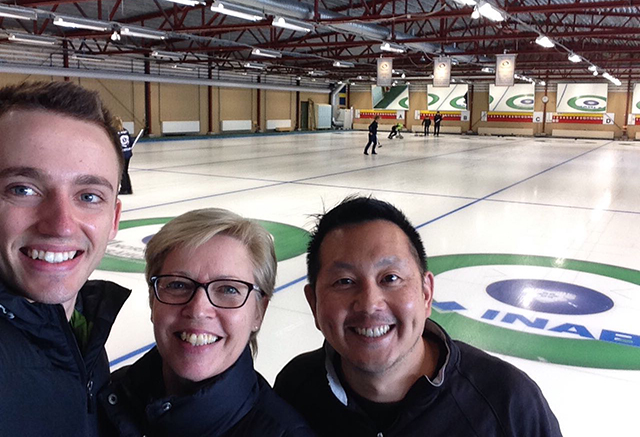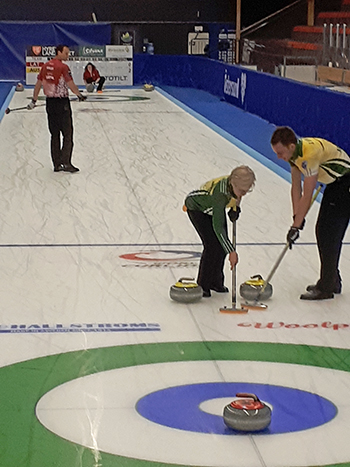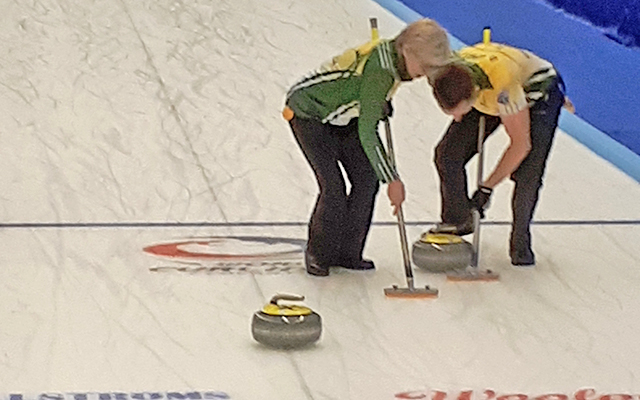Amid stiff competition, Australian national curling coach lets things slide
Despite Australia’s subtropical climate, alumnus and Melbourne resident Pete Manasantivongs spends a great deal of time on ice. As coach of the national curling team, he led the Aussies to an 18th place finish at the world mixed doubles championship in Sweden. The team nearly defeated the world champion Swiss—not bad for a nation that largely lacks ice or snow.
Winter sports were far from his mind as a child growing up in sunny, suburban Los Angeles. Manasantivongs, A.B. ’99, first experienced an icy winter when he enrolled at Harvard, opting to concentrate in applied math at the John A. Paulson School of Engineering and Applied Sciences (SEAS) because of his affinity for numbers.
“I found there was a certain beauty to math,” he said. “I was drawn toward the applied side because I wanted to see the tangible outcomes of what I was studying.”

Manasantivongs with Australian National Curling Team members Lynn Hewitt and Dean Hewitt, a mother-son curling duo. (Photo provided by Pete Manasantivongs.)
At Harvard, Manasantivongs became fascinated by optimization, operations research, and algorithms. But as commencement approached, he decided to pursue his other passion—foreign languages—in graduate school. He was accepted into the inaugural class of Gates Cambridge Scholars and took off for the storied English university to complete a Ph.D. in linguistics.
“I had always been fascinated by the idea that I could connect with someone who had a different enough background from me that we didn’t have the same mother tongue,” he said. “There is also something mathematic about languages that appealed to me. There seemed to be systematic similarities and differences between the Romance Languages I studied.”
After finishing his Ph.D., he returned to California and began working as a linguistic risk analyst at marketing firm Lexicon Branding. Manasantivongs analyzed risks associated with writing or speaking potential brand names in other languages.
For instance, perhaps a brand name sounds similar to a swear word in a certain language. Manasantivongs and his team conducted risk assessments to determine how likely consumers in that country would be to associate the brand with the bad word. They would then help clients mitigate that risk—maybe by advising that the brand name always appear in Latin characters, if it looks like a swear word when written in the Cyrillic alphabet.
While it was intriguing work, Manasantivongs wanted to learn more about different elements of business, so he enrolled in the Melbourne Business School’s joint MBA/master of marketing program.
After graduation, he landed a job at his alma mater as a research associate for the Asia Pacific Center for Social Impact. In partnership with Zoos Victoria, he studied what drives people to consider the ethical implications of products they purchase. The research focused on palm oil, the production of which contributes to deforestation in orangutan habitats.
Manasantivongs continued his career at the business school, eventually becoming academic director of the master of business analytics program. He worked on curriculum development to ensure the program was meeting the needs of students and employers. He also coached students through challenges of the rigorous academic program.
“I think back to when I was that age making the transition to grad school; I would have really appreciated having more active guidance, not just around learning, but also life in general,” he said. “I enjoyed being a source of mentorship towards their learning and career goals, but also their personal goals.”
 Though his administrative role wrapped up in October, he continues to serve as a Senior Fellow, teaching international business and data visualization courses. He now has flexibility to devote himself to his most recent passion: curling.
Though his administrative role wrapped up in October, he continues to serve as a Senior Fellow, teaching international business and data visualization courses. He now has flexibility to devote himself to his most recent passion: curling.
Manasantivongs was enchanted by the icy sport while watching the 2002 Winter Olympics. After the 2010 Games, an ice rink opened on the outskirts of Melbourne, and he decided to try his hand at curling. He was instantly hooked, and after achieving Australian citizenship five years ago, he formed a curling team and began competing at the national level in 2016.
“Some people call curling chess on ice,” he said. “You don’t just have to think about your next move, but you have to anticipate moves further ahead, what you might do, what your opponent might do, and how you would respond to that. . . I do try to think from a mathematical perspective around strategy and shot making. It is not as formal or rigorous as my statistics courses at Harvard, but there is some sort of quantitative assessment that goes through curlers’ minds.”
The biggest challenge of curling in Australia is the lack of dedicated curling ice, he said. To create curling ice, water is dripped onto the rink’s surface, a process called pebbling, which changes the friction between the curling stone and the ice. Since the team shares a rink with figure and race skaters, they must travel to dedicated curling rinks in New Zealand twice a year during competition preparations.
Last year, Manasantivongs placed third in the Australian nationals, and was asked to coach the national team. He jumped at the opportunity, and despite the challenges of preparing a team for stiff competition against countries with colder climates, he was impressed by their performance in Sweden.
The recent world championships were the first event in the next Olympic cycle, and the team has its sights set on the 2022 Games in Beijing. There is much work to be done, from training to fundraising, and he is readying himself for the challenge of leading the team through each stage.
For Manasantivongs, who began his career immersed in the quantitative aspects of applied mathematics, the personal side of coaching is what he finds most rewarding.
“There is a need to understand how to get the best out of your athletes. A lot of it is making sure that you know how best to communicate with each person, and with the team unit as a whole,” he said. “It brings a human element to coaching that I enjoy learning about, working through, and developing in myself as well.”
